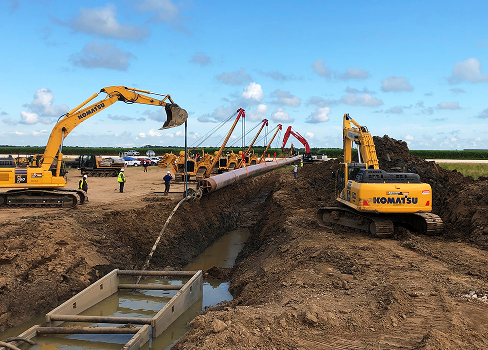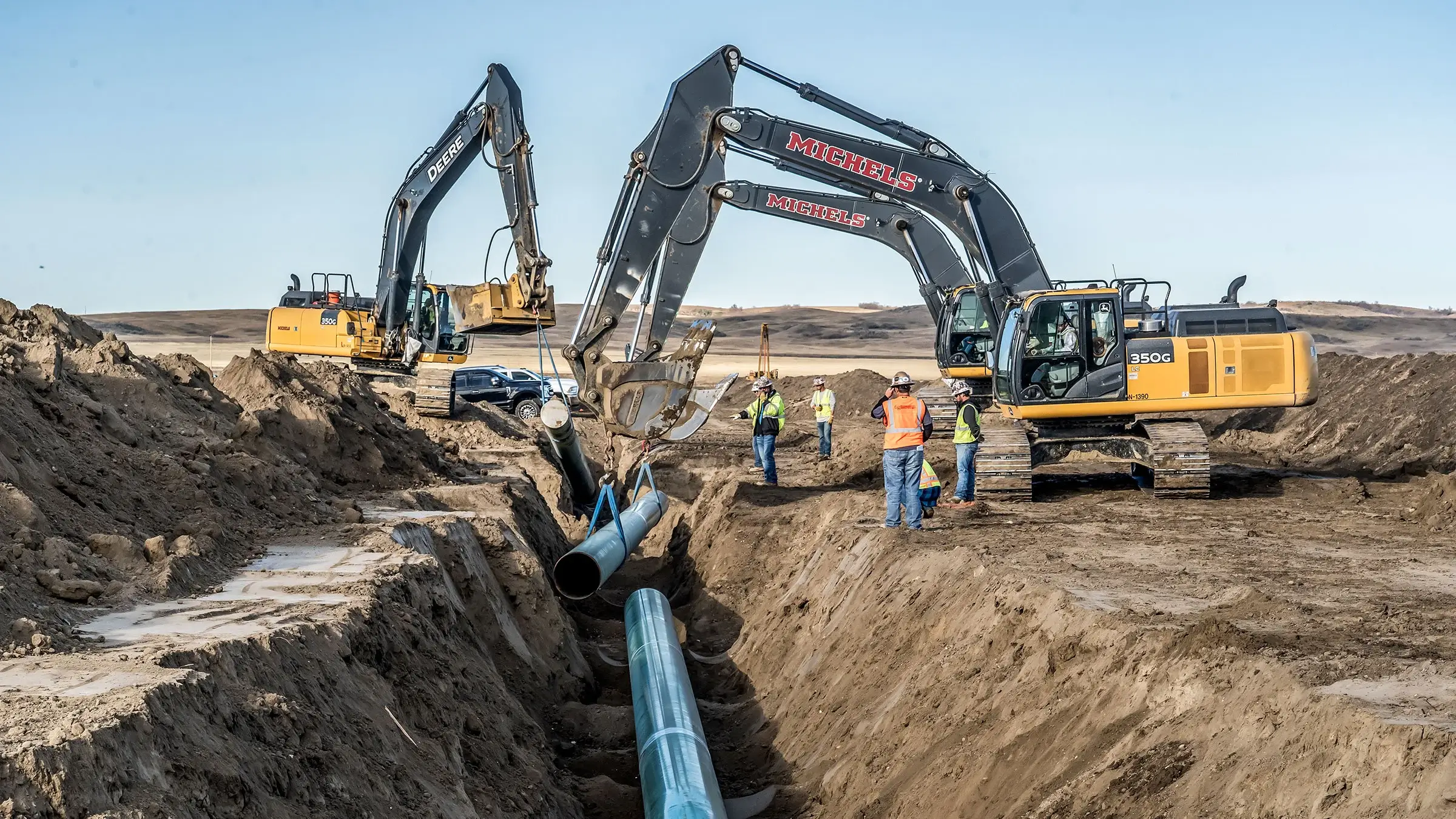How Pipeline Construction Services Use Technology to Improve Efficiency
The Essential Overview to Recognizing Pipeline Construction Services and Their Importance
Pipeline Construction services are basic to the transport of essential resources such as gas, water, and oil. These solutions include thorough planning and execution, adhering to rigorous safety and security and ecological criteria. As the industry adapts to modern-day challenges, recognizing its components and ramifications ends up being progressively vital. What factors add to the expanding relevance of these services in today's economy? The adhering to sections will discover these important elements.
Summary of Pipeline Construction Solutions
Pipeline Construction services encompass a range of tasks crucial for the installation and maintenance of pipes made use of to move numerous compounds, including gas, water, and oil. These services are important for ensuring the efficient and secure motion of sources from one place to another. The process commonly begins with complete preparation and layout, which takes into consideration regulatory demands, ecological factors to consider, and logistical difficulties.
Excavation and grading of the land are performed to prepare the website for Pipeline installment as soon as planning is total. This is followed by the real laying of the pipes, which involves welding or joining areas together to create a continual circulation course. After setup, rigorous screening is done to ensure stability and safety. Upkeep services are likewise provided to attend to any kind of issues that may emerge in time. Overall, Pipeline Construction services play a pivotal duty in supporting facilities for energy and water circulation.
Trick Components of Pipeline Construction
A successful Pipeline Construction task depends on numerous crucial parts that guarantee the risk-free and effective installment of the Pipeline system. Thorough website analyses are crucial, as they recognize the ecological and geographical variables that might affect Construction. Next, the selection of suitable products, such as installations and pipes, is necessary for safeguarding resilience and compatibility with the transported compounds.
Advanced Construction techniques, consisting of trenchless modern technology and directional drilling, improve performance and lessen ecological impact. Effective project monitoring is another essential part, coordinating labor, equipment, and timelines to satisfy job goals.
In addition, interaction amongst stakeholders, consisting of designers, professionals, and local authorities, assurances positioning on project specifications and demands. Comprehensive top quality control steps throughout the Construction process make certain conformity with industry criteria and maximize the Pipeline's functional life-span. Collectively, these components develop the backbone of a successful Pipeline Construction project.
Security Requirements and Laws in Pipeline Construction

Regulatory bodies, such as the Occupational Safety and Health And Wellness Administration (OSHA) and the Pipeline and Hazardous Materials Security Management (PHMSA), stated details needs that regulate Construction practices. These consist of protocols for tools use, worker training, and emergency reaction treatments. By applying these criteria, Construction companies not just secure their employees however additionally safe public count on. Ultimately, rigorous precaution add to the long-term success of Pipeline projects, guaranteeing they fulfill both functional and ecological expectations.
Environmental Considerations in Pipeline Projects

Ecological considerations are essential to the planning and execution of Pipeline projects. These tasks should evaluate potential effect on communities, water resources, and neighborhood wild animals. Performing complete environmental influence evaluations (EIAs) is important, permitting stakeholders to determine and reduce risks before Construction starts.
Safeguarding delicate areas, such as environments and wetlands, commonly requires applying particular layout features or different routing to decrease disruption. In addition, Pipeline operators are charged with developing methods for avoiding spills and leakages, which can have terrible results on the environment.
Involvement with regional communities is important, as public issues can lead to job alterations that enhance environmental management. Compliance with policies established by environmental companies assures that projects satisfy sustainability criteria, fostering a balance in between facilities demands and ecological preservation. Inevitably, addressing environmental factors to consider not just safeguards nature but likewise advertises area trust and project feasibility.
The Function of Modern Technology in Pipeline Construction
Modern technology plays an essential role in modern Pipeline Construction, boosting performance and accuracy. Advanced evaluating strategies enable for precise planning and execution, minimizing environmental impact and job delays. Additionally, the integration of automation and robotics streamlines operations, reducing labor costs and improving safety on Construction websites.
Advanced Checking Strategies
Advanced checking methods play an important duty in the effective execution of Pipeline Construction tasks. These methods take advantage of innovative technology to guarantee precise mapping and evaluation of the terrain where pipelines will be mounted. Methods such as Geographic Details Systems (GIS), LiDAR (Light Detection and Ranging), and 3D modeling enable engineers to evaluate the landscape and picture, identifying environmental worries and potential challenges. By using these innovative devices, teams can boost accuracy in placing and positioning, greatly lowering the risk of mistakes during Construction. Additionally, real-time data collection permits immediate changes and notified decision-making throughout the project lifecycle. Inevitably, these surveying innovations contribute to improved efficiency, safety, and sustainability in Pipeline Construction efforts.
Automation and Robotics

Economic Impact of Pipeline Infrastructure
Pipeline infrastructure plays a vital duty in shaping regional economic situations and facilitating trade. By giving a dependable ways of moving oil, gas, and other assets, pipes decrease transport prices and boost supply chain effectiveness. This facilities brings in financial investment, boosts work development, and promotes financial development in bordering areas.
The Construction and maintenance of pipes contribute considerably to local economies, producing numerous work chances in numerous markets, from engineering to labor. The influx of work commonly causes raised investing in neighborhood organizations, better bolstering financial task.
In addition, pipes improve energy safety by making sure a steady supply of resources, which is vital for industrial operations and residential needs. As regions become adjoined via Pipeline networks, they get to wider markets, boosting competitiveness and economic resilience. The economic impact of Pipeline infrastructure is multifaceted, affecting both prompt regional economic climates and wider local advancement.
Future Trends in Pipeline Construction Services
The future of Pipeline Construction services is evolving in feedback to technological advancements, governing changes, and expanding environmental factors to consider. Advancements such as drones and robotics are simplifying assessment and maintenance procedures, boosting security and effectiveness. Automation is poised to lower labor costs and raise accuracy in Construction operations. In addition, the enhancing focus on sustainability is prompting business to take on green materials and methods, straightening with global initiatives to reduce carbon footprints.
Regulative structures are also adapting to resolve environmental effects, pressing for greater transparency and responsibility in Pipeline tasks. Additionally, the combination of clever technologies, including real-time tracking systems, is anticipated to boost the reliability and performance of Pipeline networks. As power needs change towards renewable sources, Pipeline Construction services will likely see a rise in jobs connected to biofuels and hydrogen transportation. On the whole, these fads show a transformative duration for the Pipeline Construction sector, concentrated on innovation and sustainability.
Frequently Asked Questions
What Sorts of Pipelines Are Typically Constructed?
Various kinds of pipes are generally created, consisting of oil, sewage, gas, and water pipelines - Pipeline Construction Services. Each serves distinct objectives, facilitating the transportation of essential resources throughout areas while sticking to security and environmental regulations
The length of time Does a Typical Pipeline Task Take?
The period of a regular Pipeline task varies significantly, typically ranging from several months to a couple of years. Variables affecting this timeline include task intricacy, regulative approvals, and ecological factors to consider that must be resolved.
That Controls Pipeline Construction Companies?
Pipeline Construction firms are controlled by various government, state, and regional agencies, consisting of the Pipeline and Hazardous Materials Safety Management (PHMSA) and state utility commissions, making certain compliance with safety and ecological standards throughout the Construction procedure.
What Prevail Materials Made Use Of in Pipeline Construction?
Typical materials made use of in Pipeline Construction consist of steel, pvc, and polyethylene. Each right here material offers distinctive benefits such as longevity, resistance, and versatility to deterioration, making them suitable for numerous applications in transporting gases and liquids.

Exactly How Are Pipeline Construction Prices Estimated?
Pipeline Construction expenses are approximated by evaluating factors such as product expenditures, labor rates, project intricacy, environmental considerations, and regulative demands (Pipeline Construction Services). Precise expense estimation guarantees efficient budgeting and project planning throughout the Construction process
Pipeline Construction solutions include a range of activities necessary for the installation and maintenance of pipes used to move various compounds, including oil, gas, and water. An effective Pipeline Construction task relies on numerous key elements that ensure the safe and efficient installation of the find this Pipeline system. Advanced checking strategies play an essential function in the successful execution of Pipeline Construction projects. Different types of pipelines are frequently built, consisting of oil, sewage, gas, and water pipes. Pipeline Construction costs are approximated by analyzing aspects such as material costs, labor rates, job intricacy, environmental factors to consider, and regulatory demands.